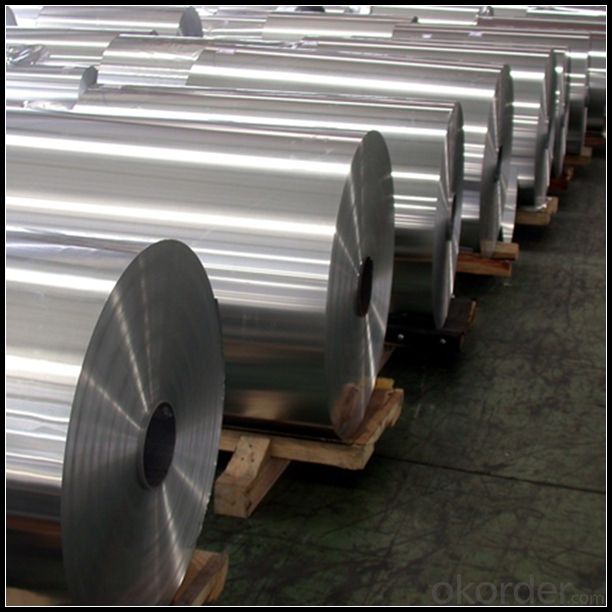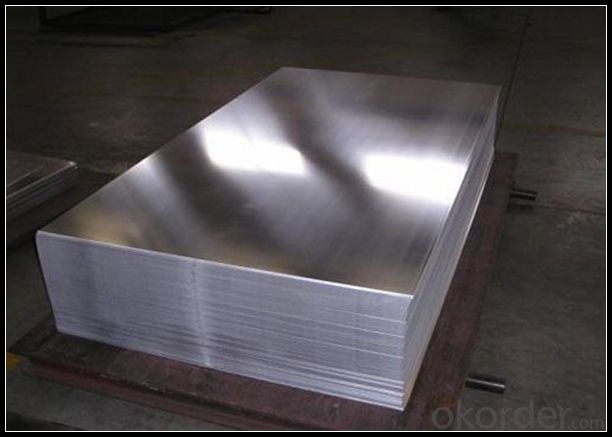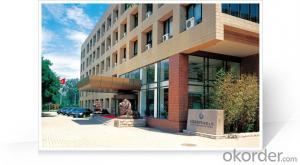Aluminium Coil Sheet in 1100 3003 5052 5754
- Loading Port:
- Shanghai
- Payment Terms:
- TT OR LC
- Min Order Qty:
- 20 m.t
- Supply Capability:
- 10000 m.t/month
OKorder Service Pledge
OKorder Financial Service
You Might Also Like
Item specifice
1. Specification of Aluminum
1) Alloy | 1050, 1060,1100, 3003 3004 3105 3005 5005 5052 etc |
2) Temper | O/H12/H14/H1/H18/H32/H34/H36/H38//H111/H112/H116/H321/T6/T651/T3/T351 etc |
3) Thickness | 0.1mm to 6mm |
4) Width | 20mm to 3300mm |
5) Coil weight | 100kgs to 6 tons depends on actual requirement |
6) Core material | Aluminum alloy |
7) Coil Inner diameter | 76mm, 152mm,or as required |
2. Application of Aluminum
Aluminum is a versatile material integral to modern life. The metal is found in everything from soda cans to cell phones to window frames to airplanes. The process for making the aluminum that goes into these products is found in the pages within the Industries section. Details about end use products are found in the Product Markets section. To learn more about each stage of the aluminum process, click on the icons below
3. Feature of Aluminum
In 1954, there were 75 registered aluminum alloys. Today, there are more than 530 registered active compositions and that number continues to grow. That underscores how versatile and ubiquitous aluminum has become in our modern world. So what are aluminum alloys and why are they important?
4. Certificate:
SGS and ROHS(if client request, paid by client), MTC(plant provided), Certificate of Origin(FORM A, FORM E, CO), Bureau Veritas and SGS (if client request, paid by client), CIQS certificate
5. Image of Aluminum


6. FAQ
Q: What is the produce prase? | ||||
A: Normally it would be 40days after received your deposit. | ||||
Q: Can you provide free samples? | ||||
A: Yes, free samples will be sent to you on freight at destination. | ||||
Q: Can I get your latest catalogue? | ||||
A: Yes, it will be sent to you in no time. | ||||
Q: What is the MOQ? | ||||
A: 3 tons | ||||
Q: What are your payment terms? | ||||
A: We accept L/C, D/A, D/P, T/T, West Union,etc. |
- Q:What is the role of aluminum coils in the construction of aircraft?
- The role of aluminum coils in the construction of aircraft is primarily to provide lightweight and strong structural components. Aluminum coils are used in various parts of an aircraft, such as the fuselage, wings, and other structural elements. The use of aluminum coils allows for better fuel efficiency, reduces overall weight, and provides durability and corrosion resistance, making it a crucial material in modern aircraft construction.
- Q:What are the applications of aluminum coils?
- Due to their unique properties and versatility, aluminum coils find wide-ranging applications in various industries. The construction industry is one major field where these coils are extensively used. They are lightweight, durable, and resistant to corrosion, making them suitable for roofing, siding, and insulation purposes. Additionally, aluminum coils are commonly employed in the production of gutters, downspouts, and ventilation systems for buildings. In the automotive sector, aluminum coils are utilized for manufacturing different components like heat shields, radiators, and condensers. The lightweight nature of aluminum makes it an ideal choice for enhancing fuel efficiency and reducing the overall weight of vehicles. Moreover, aluminum coils are employed in the production of heat exchangers and air conditioning systems in automobiles. The packaging industry also heavily relies on aluminum coils. They are commonly used to manufacture beverage cans, food containers, and packaging materials. Aluminum's high ductility and excellent formability make it a preferred material for producing these products. Additionally, aluminum coils act as a barrier against moisture, light, and oxygen, ensuring the preservation and protection of the packaged contents. In the electrical and electronics industry, aluminum coils find a crucial application. They are utilized in the production of transformers, power distribution systems, and electrical conductors. The high electrical conductivity and low density of aluminum make it advantageous for these purposes. Furthermore, aluminum coils are employed in the manufacturing of appliances such as refrigerators, air conditioners, and washing machines. They are also utilized in the production of furniture, decorative items, and various consumer goods. In conclusion, aluminum coils have vast and diverse applications in industries ranging from construction and automotive to packaging, electrical, and consumer goods. The combination of lightweight, durability, corrosion resistance, and excellent formability make aluminum coils an indispensable material in numerous sectors.
- Q:How are aluminum coils used in the construction industry?
- Aluminum coils are widely used in the construction industry due to their numerous beneficial properties. These coils are primarily employed in the fabrication of various building components, such as roofs, facades, gutters, and cladding systems. One of the main advantages of using aluminum coils in construction is their lightweight nature. Aluminum is significantly lighter than other commonly used metals like steel, making it easier to handle and install. This lightweight property also reduces the load on the building structure, allowing for more flexibility in design and minimizing the overall construction costs. Furthermore, aluminum coils offer exceptional corrosion resistance. Aluminum naturally forms a protective oxide layer on its surface, which prevents it from rusting or deteriorating when exposed to moisture or harsh environmental conditions. This corrosion resistance ensures the longevity and durability of the building components, reducing maintenance and replacement costs in the long run. Aluminum coils are also highly malleable and can be easily formed into various shapes and sizes. This versatility allows architects and engineers to create innovative and aesthetically pleasing designs. Aluminum coils can be bent, folded, or molded to fit any architectural requirement, enabling the construction of unique and visually appealing structures. In addition, aluminum is an excellent conductor of heat and electricity. This property makes aluminum coils ideal for applications that require efficient thermal or electrical conductivity. For example, aluminum coils are often used in HVAC systems to transfer heat or in electrical wiring to ensure optimal performance. Moreover, aluminum is a sustainable and environmentally friendly material. It is 100% recyclable without losing its properties, making it a perfect choice for sustainable construction practices. The recyclability of aluminum coils reduces waste generation and conserves natural resources, contributing to a greener and more sustainable construction industry. In conclusion, aluminum coils are extensively used in the construction industry due to their lightweight nature, corrosion resistance, malleability, efficient conductivity, and sustainability. These coils facilitate the construction of durable, aesthetically pleasing, and energy-efficient buildings while reducing costs and environmental impact.
- Q:What are the different coil slitting widths available for aluminum coils?
- The different coil slitting widths available for aluminum coils can vary depending on the specific requirements and the capabilities of the manufacturer. Generally, aluminum coils can be slit into a wide range of widths, ranging from as narrow as a few millimeters up to several meters wide.
- Q:How do aluminum coils contribute to reduced maintenance costs?
- Aluminum coils contribute to reduced maintenance costs primarily due to their exceptional durability and resistance to corrosion. Unlike other metals, such as copper, aluminum coils are specifically designed to withstand harsh environmental conditions, including exposure to moisture, salt, and chemicals. This resistance to corrosion ensures that the coils remain intact and functional for extended periods, minimizing the need for frequent repairs or replacement. Additionally, aluminum coils are lightweight, making them easier to handle and install, which reduces labor costs associated with maintenance activities. Furthermore, their high thermal conductivity allows for efficient heat transfer, resulting in increased energy efficiency and lower utility bills. Overall, the use of aluminum coils in HVAC systems helps to reduce maintenance expenses and prolong the lifespan of the equipment, making them a cost-effective choice for both residential and commercial applications.
- Q:Can aluminum coils be used in architectural applications?
- Yes, aluminum coils can be used in architectural applications. Aluminum is a versatile and durable material that is commonly used in the construction industry for its lightweight nature, corrosion resistance, and ease of fabrication. Aluminum coils are often utilized in architectural applications such as roofing, cladding, and facades due to their ability to be easily formed into various shapes and sizes. Additionally, aluminum coils can be coated with different finishes to enhance their aesthetics and provide additional protection against weathering and fading. Overall, aluminum coils are a popular choice for architectural applications as they offer a combination of functionality, aesthetics, and longevity.
- Q:When the aluminum roll is rolled 0.14, when the coil is taken off, what happened to the loose layer?
- I think the 0.14mm is certainly not the aluminum coil lining sleeve forgot, then the biggest doubt is the oil removal effect is not good, with rolling after the aluminum layer between the leakage for aluminium roll support is not enough, the collapse of the volume, the specific performance is the edge of the circular aluminum layer was uniform into ripples;
- Q:Are there any fire safety considerations when using aluminum coils?
- Yes, there are fire safety considerations when using aluminum coils. Aluminum is a highly flammable material and can ignite under certain conditions, such as exposure to high temperatures or direct contact with an open flame. Therefore, it is important to ensure proper insulation and ventilation when using aluminum coils to prevent the risk of fire. Additionally, regular inspections and maintenance should be carried out to identify any potential fire hazards and address them promptly.
- Q:How do aluminum coils contribute to the fire resistance of products?
- Aluminum coils contribute to the fire resistance of products in several ways. Firstly, aluminum has a high melting point, which means that it can withstand high temperatures before it starts to deform or melt. This property is crucial in preventing the spread of fire as it helps to maintain the structural integrity of the product, limiting the fire's ability to penetrate or weaken it. Additionally, aluminum has excellent thermal conductivity, meaning it can efficiently dissipate heat. This characteristic plays a crucial role in fire resistance as it helps to cool down the surrounding area, minimizing the risk of ignition or combustion of nearby materials. By quickly transferring heat away from the source, aluminum coils can prevent the fire from spreading or escalating. Moreover, aluminum is non-combustible, which means it does not burn or support combustion. This property is vital in fire resistance as it prevents the aluminum coils from adding fuel to the fire. Instead, aluminum acts as a barrier, preventing the flames from reaching other flammable materials and reducing the overall fire hazard. Furthermore, aluminum is resistant to corrosion, which enables the coils to maintain their structural integrity over time, even in high humidity or corrosive environments. This durability is crucial as it ensures that the fire resistance properties of products remain intact, providing long-lasting protection against fire hazards. Overall, aluminum coils contribute to the fire resistance of products through their high melting point, excellent thermal conductivity, non-combustible nature, and resistance to corrosion. These properties work together to limit the spread of fire, dissipate heat efficiently, prevent the addition of fuel to the fire, and maintain the structural integrity of the product, ultimately enhancing its fire resistance capabilities.
- Q:Aluminum is a metal and nitrate (nitrogen) is a non metal so shouldn't they form an ionic bond and not a covalnt bond? And if it were an ionic bond wouldn't it be called aluminum mononitrate? But it is a covalnt bond (thus a molecular bond and so there is no mono in the name). Pleas help I'm very confused!
- The questioner probably means aluminium nitride, AlN, which has substantial covalent character due to massive polarisation of the large nitride ions by the small and highly charged Al3+ ions.
1. Manufacturer Overview |
|
|---|---|
| Location | |
| Year Established | |
| Annual Output Value | |
| Main Markets | |
| Company Certifications | |
2. Manufacturer Certificates |
|
|---|---|
| a) Certification Name | |
| Range | |
| Reference | |
| Validity Period | |
3. Manufacturer Capability |
|
|---|---|
| a)Trade Capacity | |
| Nearest Port | |
| Export Percentage | |
| No.of Employees in Trade Department | |
| Language Spoken: | |
| b)Factory Information | |
| Factory Size: | |
| No. of Production Lines | |
| Contract Manufacturing | |
| Product Price Range | |
Send your message to us
Aluminium Coil Sheet in 1100 3003 5052 5754
- Loading Port:
- Shanghai
- Payment Terms:
- TT OR LC
- Min Order Qty:
- 20 m.t
- Supply Capability:
- 10000 m.t/month
OKorder Service Pledge
OKorder Financial Service
Similar products
New products
Hot products
Related keywords





























